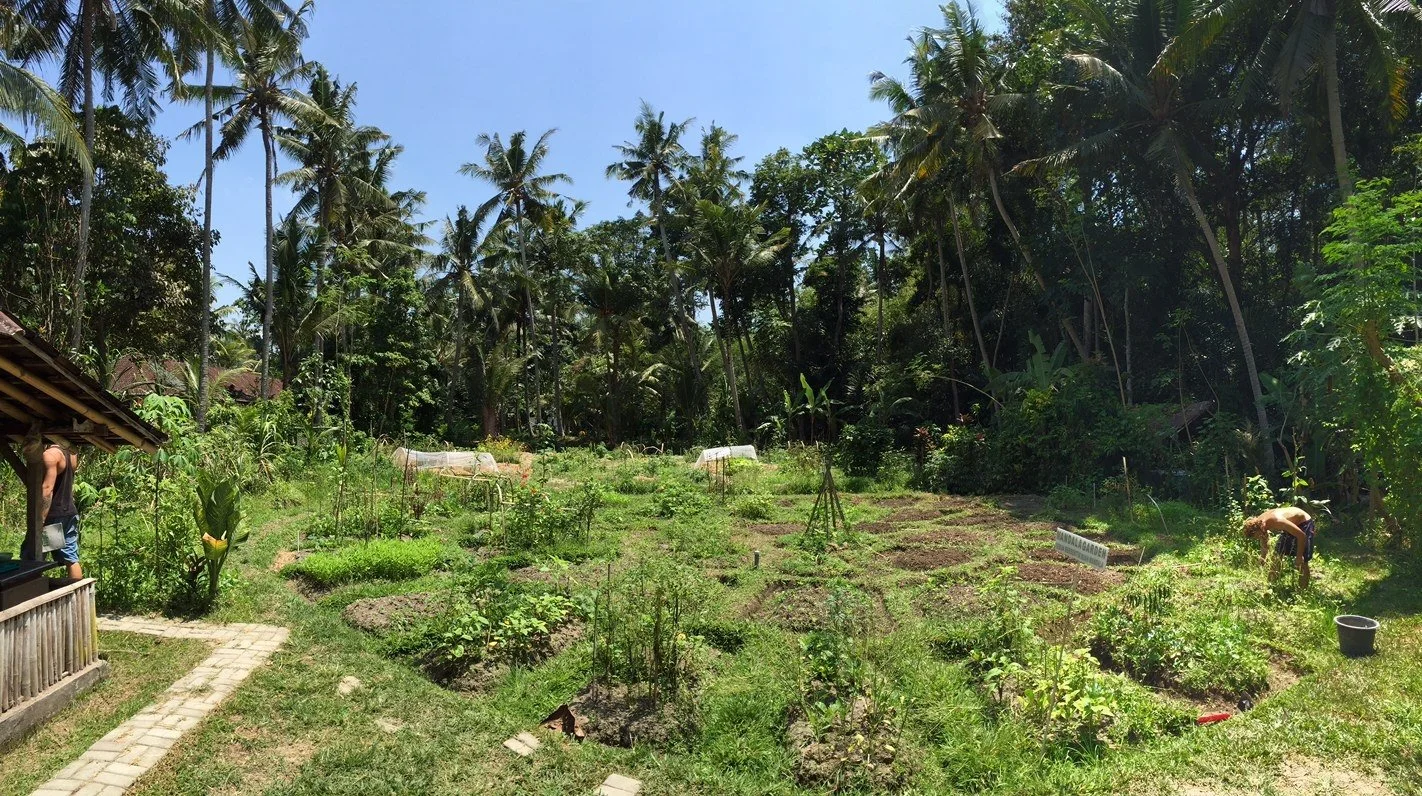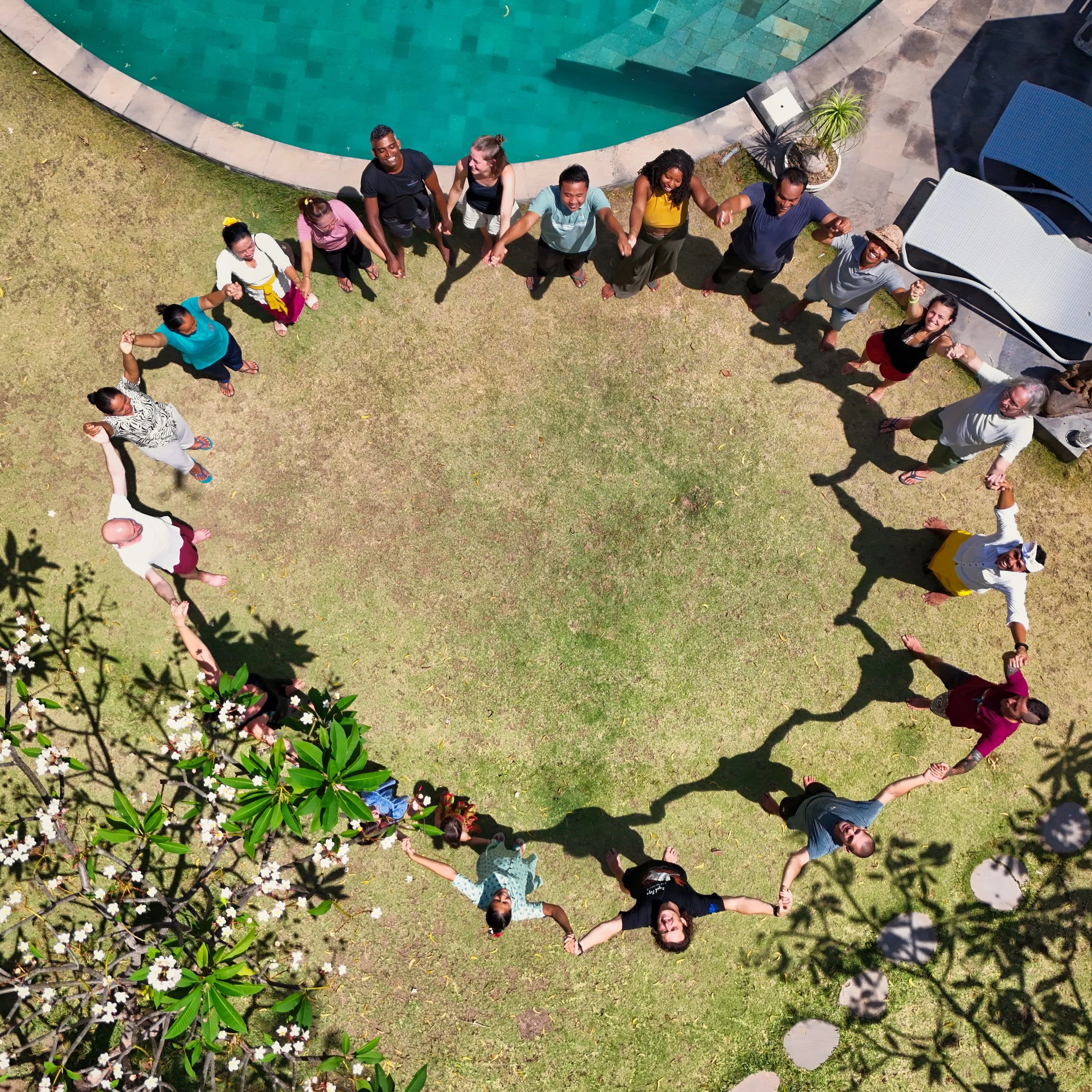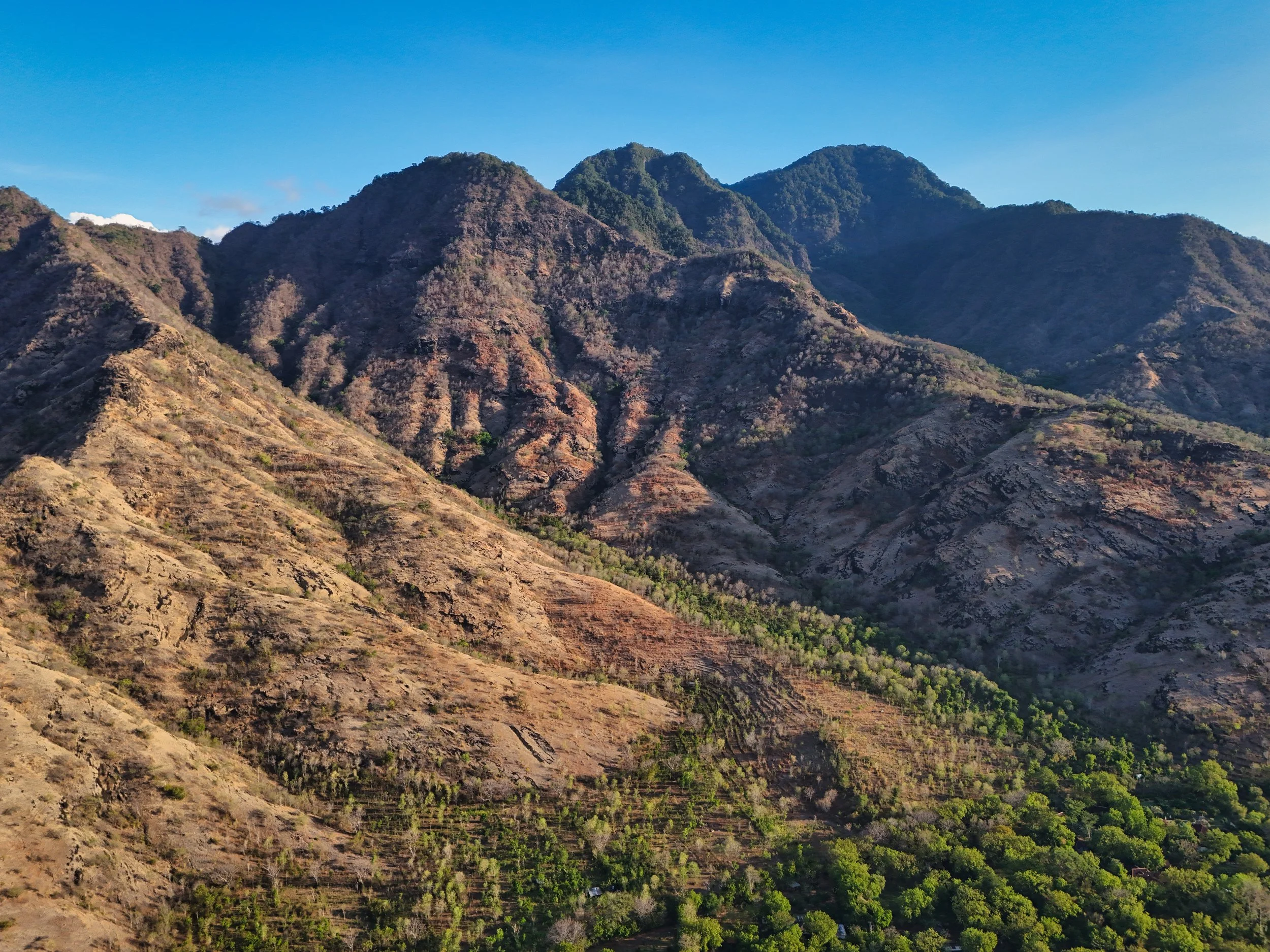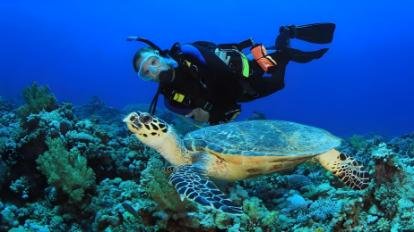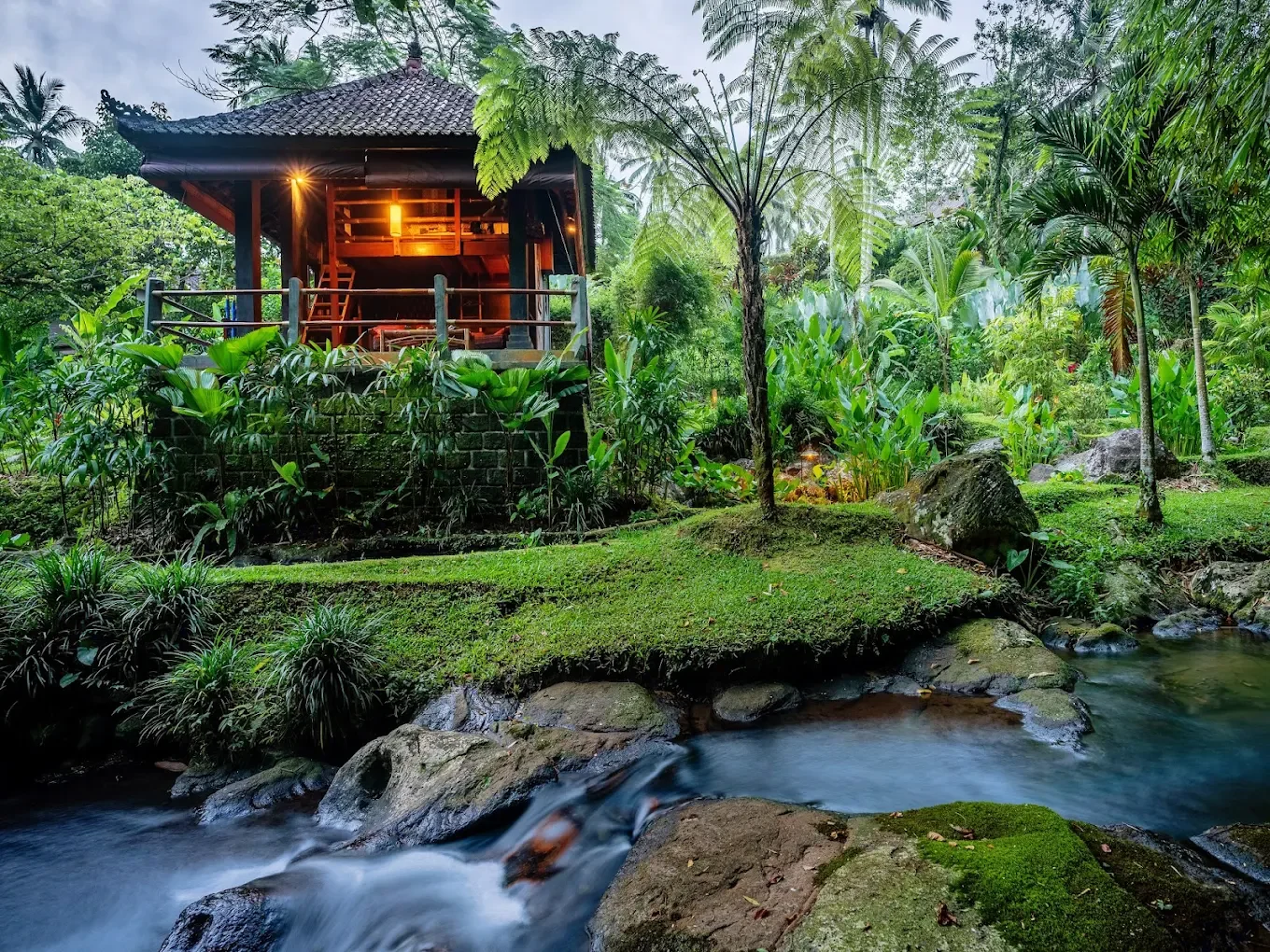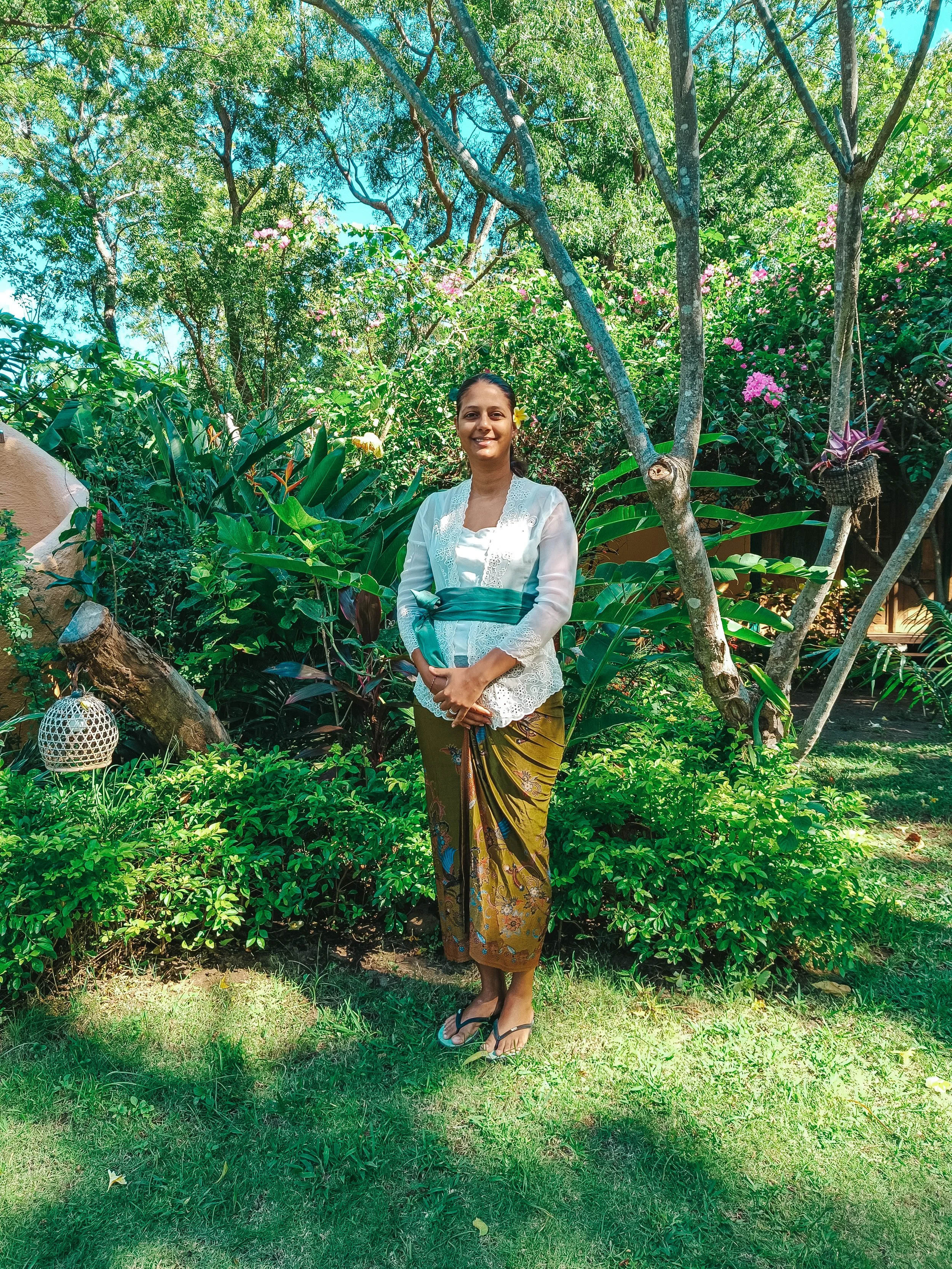
Bali Ecovillage Tour
10 DAYS | Max group size: 16
Would you like to experience Bali beyond the tourist trail?
Join us on a unique 10 day tour exploring how “the Island of the Gods” has become a vibrant hub for eco-living, cultural preservation, and community innovation. Bali offers a rare blend of ancient wisdom and modern sustainability, making it a powerful place to reconnect—with nature, others, yourself, and a higher purpose in life.
From health and wellness villages to regenerative farming and spiritual sanctuaries, you’ll meet locals and expats co-creating new ways of living in harmony with the land. Inspired by Tri Hita Karana—the Balinese philosophy of harmony—this journey explores:
People & People: Building meaningful connections
People & Nature: Living in balance with the earth
People & Divine: Honoring one’s spirit and local tradition
Whether you're curious about ecovillages, considering a lifestyle shift, or simply seeking deeper inspiration, this experience offers space to reflect, learn, and grow. You’ll also gain insights into the practical side of relocating - legal and financial.
Come walk with us. Discover Bali’s heartbeat, and take your first steps toward a more intentional way of living.
Bali Ecovillage Tour
Next tour dates:
Jan 26 - Feb 4, 2026
This trip is now SOLD OUT.
Click “book now” to see current pricing.

Tour Itinerary
Below is an idea of what you can expect to experience during your time in Bali.
Day 1 – Welcome to Bali!
Arrive and settle into Mana Earthly Paradise - an eco-conscious accommodation with many exciting highlights. Enjoy the healthy cuisine, local product boutique, and a group orientation as you meet your fellow travelers.
Day 2 – Community Gardening and Taman Petanu Eco Neighborhood
Today we’ll take part in a hands-on workshop with the Jiwa Community Garden, followed by a nourishing lunch made with fresh, locally sourced ingredients. Then in the afternoon we’ll visit Taman Petanu Eco Neighborhood, a pioneering regenerative community nestled in Bali’s lush landscape. Learn about their innovative approaches to sustainable living and community collaboration.
Day 3 – Exceptional Green School
Visit a community built ecologically near the stunning green school, a globally celebrated example that has shifted what is possible in terms of education and sustainability.
Day 4 – Into the Highlands of Bali’s Heritage and Culture
Escape to the cool, fresh air of Bali’s highlands, where lush landscapes meet timeless traditions. Take part in an inspiring permaculture tour to learn about sustainable farming practices, then join a hands-on cooking class using fresh, local ingredients.
Day 5 – Waterfalls & Wisdom
Connect with the land at Aling-Aling waterfalls and arrive in Pemuteran for a powerful visit to a turtle rehabilitation center and a conversation on local marine conservation. Discover the innovative Biorock reef restoration project and see how technology and community effort are bringing coral reefs back to life.
-
Day 6 – Reef Regeneration & Eco-Tourism
Snorkel among vibrant coral reefs and join a hands-on turtle release, helping these gentle creatures return to the sea. Learn from local experts about reef restoration and how eco-tourism supports both conservation and community livelihoods. End the day relaxing by the shore, inspired by the impact of responsible travel.Day 7 – Animal Rescue & Island Visit
Visit with Femke from Jaan Animal Rescue for an engaging talk while exploring a local island, part of Bali Barat National Park. Meet Rosa from Plastic Free Bali and take part in a beach cleanup.Day 8 – Hot Springs and National Park Visit
Swim in natural hot springs, followed by a local temple’s blessing in traditional wear and an afternoon hike through Bali Barat National Park; a chance to spot some of Bali’s most extravagant wildlife!Day 9 – Reflection & Celebration
Enjoy a relaxed final day with optional massages, hot springs, or beach time. Gather in a circle for a closing celebration and time to reflect.Day 10 – Departures
After breakfast, we head to Nuanu Creative City, a vibrant hub for art, innovation, and sustainability. Explore its creative spaces and coastal setting before continuing to the airport with hearts full and a vision for the future.
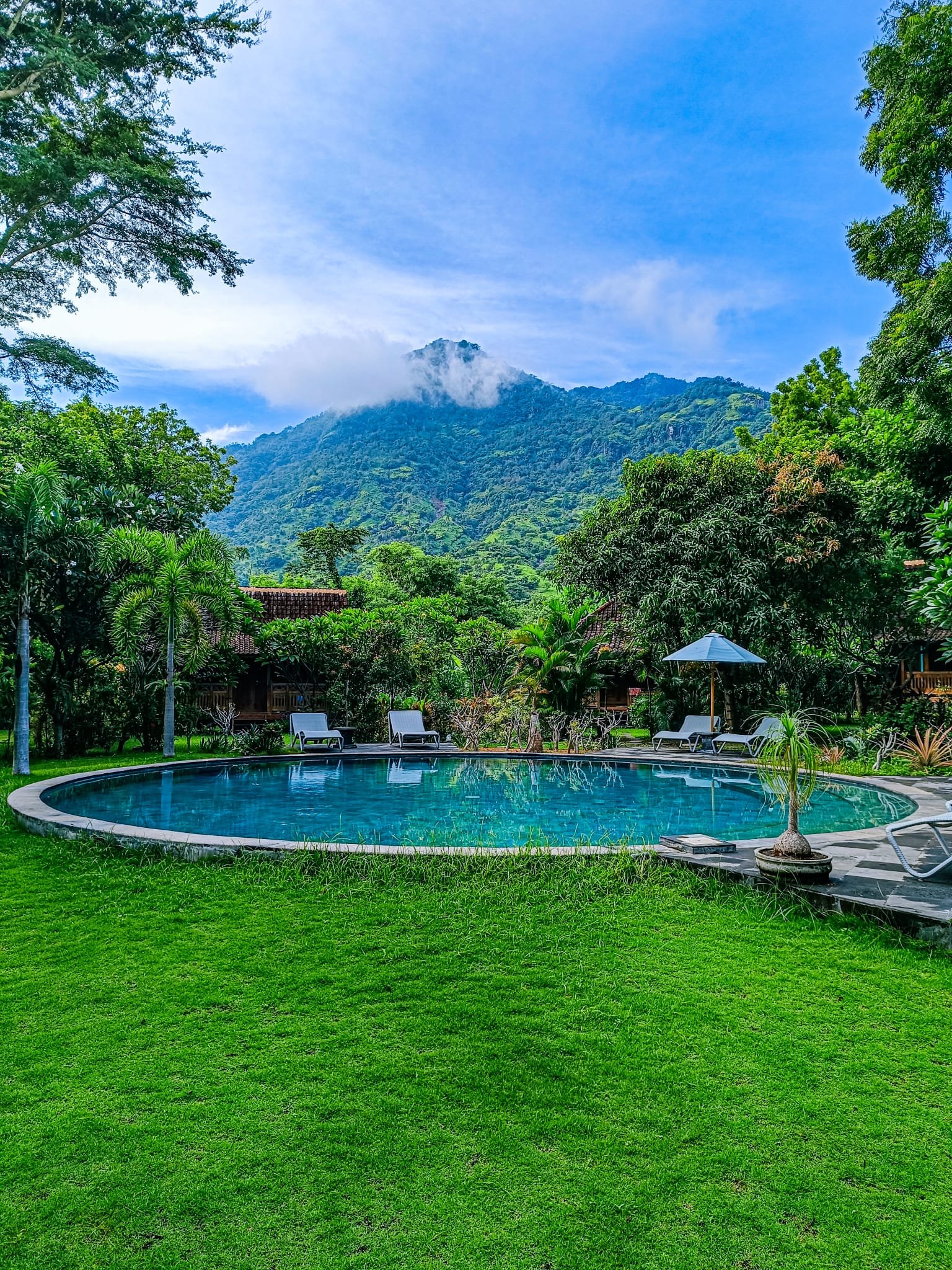
Featured Communities
Below are the communities and projects we’ll visit during the trip.
Taman Petanu Eco Neighborhood
Just 15 minutes south of Ubud, Taman Petanu Eco Neighborhood is a consciously evolving community that embraces diversity and radiates harmony, creativity, and joy.
Guided by the Balinese philosophy of Tri Hita Karana—the balance between people, nature, and spirit—Taman Petanu showcases sustainable living in action through permaculture landscaping, natural building, and community-based systems for waste and water management.
Visitors can connect with residents, explore lush gardens, and learn how art, ecology, and spirituality intertwine in daily life.
Leave inspired by this living model of regeneration and community, offering a glimpse into a future rooted in balance, creativity, and shared purpose.
Jiwa Community Garden is a vibrant green space in Canggu, Bali, dedicated to regenerative agriculture, community learning, and connection to nature. It was founded in 2020 by three friends on previously unused land, transforming it into a productive organic garden, a composting facility, and a Permaculture Learning Center. Jiwa offers workshops, community events, and opportunities for people to learn about gardening, composting, and sustainable practices, while also fostering connections between local and expat communities.
Regenerative Agriculture: Jiwa focuses on sustainable farming practices, including composting and using organic waste to enrich the soil.
Community Learning: They offer workshops and courses on permaculture, gardening, composting, and growing your own food, emphasizing the importance of youth involvement in regenerative agriculture.
Community Connection: Jiwa provides a space for locals and expats to gather, garden, and learn together, bridging the gap between communities.
Permaculture Learning Center: The garden features a learning center where visitors can learn about permaculture principles and practices.
Positive Impact: Jiwa aims to address issues like waste management, soil health, and the decline of the farming community in Bali.
Green School is an international school in Bali, Indonesia, recognized for its unique, nature-integrated design and its commitment to sustainability education. The school emphasizes hands-on learning, community engagement, and preparing students to be responsible global citizens focused on sustainable practices.
Location and Design: The campus is primarily constructed from bamboo and is designed around principles of permaculture and organic gardening. The school is known for its open-air, wall-less classrooms that blend seamlessly with the natural environment
Educational Philosophy: Focuses on a holistic, community-integrated, and entrepreneurial learning program. Aims to inspire students to innovate, find purpose, love learning, and make a positive impact. Emphasizes experiential learning, with students actively involved in organic gardening, building projects, and other hands-on activities. Encourages students to "learn how to learn" and develop a lifelong passion for learning. The curriculum integrates sustainability principles across all subjects, addressing climate change and promoting environmental awareness
Community and Sustainability: The school fosters a strong sense of community, including students, teachers, parents, and the local neighborhood. It operates on the principles of a circular economy, aiming to eliminate waste and promote responsible resource management. Green School is part of a global movement dedicated to transforming education and creating a more sustainable future.
Plastic Free Bali is a community-driven initiative focused on reducing plastic pollution in Bali, particularly in the village of Pemuteran. They achieve this through a multi-pronged approach including waste management facility improvements, community education, women's leadership empowerment, and promoting self-sustaining waste management systems within villages. The program aims to empower villages to manage waste effectively, reduce single-use plastic consumption, and improve overall environmental health.
Waste Management and Facility Enhancement: Plastic Free Bali works to establish and improve waste sorting facilities at the village level, including training staff in circular economy principles and sustainable practices.
Community Education: A key aspect of the program involves educating local communities on proper waste sorting, reducing single-use plastic usage, and introducing eco-friendly alternatives.
Women's Leadership: The initiative actively empowers women within the community to become leaders in the fight against plastic pollution and to create a healthier environment.
Self-Sustainability: Plastic Free Bali aims to implement systems that make waste management facilities financially independent and self-sustaining within the villages.
Animal Rescue & Rehabilitation JAAN, which stands for Jakarta Animal Aid Network, is a non-profit organization in Indonesia dedicated to improving animal welfare. Founded in 2008, JAAN focuses on rescuing, rehabilitating, and protecting both domestic and wild animals. They work to combat illegal wildlife trade, address animal abuse, and promote compassionate treatment of animals through various programs and campaigns.
Rescue and Rehabilitation: JAAN actively rescues animals from situations of abuse, neglect, or illegal trade. They provide medical care, rehabilitation, and find suitable homes for rescued pets. They also have centers for rescuing and rehabilitating endangered species like sea turtles and primates.
Wildlife Protection: JAAN works to combat the illegal wildlife trade, including rescuing animals from the pet trade and working with authorities to stop smugglers. They also focus on protecting endangered species and raising awareness about the importance of wildlife conservation.
Education and Awareness: JAAN prioritizes education about animal welfare, aiming to change attitudes and promote compassionate treatment of animals through various programs and campaigns.
Collaboration and Advocacy: JAAN collaborates with various Indonesian government ministries and other organizations to advocate for stronger animal protection laws and policies. They also work with local communities to promote responsible pet ownership and animal care.
Friends of Menjangan is a community movement dedicated to preserving the coral reefs and marine environment of Menjangan Island and its surrounding area in West Bali. Initiated by Nono; it involves local communities, resorts, schools, and volunteers. Their work includes removing Crown-of-Thorns starfish, maintaining mooring buoys, and organizing beach and reef clean-ups. They also focus on education, raising awareness about the importance of coral reefs and the impact of pollution through programs like "Learning by Doing" camping trips for students.
Conservation Focus: Friends of Menjangan works to protect the coral reefs around Menjangan Island, which are known for their health and biodiversity.
Community Involvement: The movement actively engages local communities, resorts, and dive operators in their conservation efforts.
Practical Actions: They remove invasive Crown-of-Thorns starfish, maintain mooring buoys to prevent anchor damage to reefs, and conduct regular clean-ups of beaches and reefs.
Educational Initiatives: The organization conducts educational programs for students and the public to raise awareness about marine conservation and the impact of pollution.
Partnerships: Friends of Menjangan partners with organizations like the Biosphere Foundation and Yayasan Dwi Asih Sejahtera to support their conservation work.
Sustainable Practices: They promote sustainable tourism and income-generating projects for the local community.
Eco-tourism in Northwest Bali centers around West Bali National Park, offering diverse habitats, wildlife viewing, and diving/snorkeling opportunities, while also supporting local communities and conservation efforts. The region promotes responsible travel that minimizes environmental impact and educates visitors about the importance of biodiversity.
West Bali National Park: This park, encompassing a peninsula and surrounding waters, features monsoon forests, rainforests, savannahs, mangrove forests, and coral reefs. It is home to the endangered Bali starling and other unique flora and fauna.
Activities: Visitors can enjoy hiking and trekking through the park, with trails leading to mountains and coastlines. Diving and snorkeling in the park's waters, especially around Menjangan Island, offer breathtaking underwater views of coral reefs.
Community Engagement: Eco-tourism initiatives in the area, like those in Banyuwedang Bay, focus on community-based tourism, ensuring local communities benefit economically from tourism while also participating in conservation efforts.
Conservation Efforts: Eco-tourism in Northwest Bali emphasizes the preservation of natural habitats and wildlife. This includes supporting initiatives like mangrove planting, waste management, and educating visitors about the importance of environmental protection.
Sustainable Practices: Eco-tourism encourages responsible travel choices, such as minimizing plastic use, supporting local businesses, and respecting the cultural heritage of the region.
Contrast with Other Areas: North Bali, including Lovina, offers a more laid-back, nature-focused experience compared to the busier tourist areas in other parts of the island.
Alaya Ecolodge is a nature-focused retreat center and lodge located in Pemuteran, Bali, Indonesia. It's known for its eco-conscious approach, utilizing natural materials like wood, incorporating sustainable practices, and offering a serene environment surrounded by tropical gardens and the sounds of nature. The lodge emphasizes a connection with nature, self, and Balinese culture, providing a tranquil escape from the typical tourist crowds.
Eco-Friendly Accommodation: The lodge features wooden bungalows and rooms designed with natural materials, aiming to minimize environmental impact.
Sustainable Practices: Alaya Ecolodge incorporates eco-friendly technologies and practices, such as using natural light, organic linen, and providing purified water in reusable glass bottles.
Tranquil Setting: Situated between the mountains and the sea, the lodge offers a peaceful atmosphere with lush gardens, ideal for relaxation and rejuvenation.
Community Focus: Alaya Ecolodge aims to foster a sense of community and connection, both with nature and with fellow travelers.
Retreat Center: Alaya Ecolodge also serves as a retreat center, offering spaces for yoga and wellness activities
Reef Seen is a dive resort and aquatic center located in Pemuteran, Bali, focused on diving and marine conservation. It's situated on the beach in the center of Pemuteran Bay, known for its diving and proximity to the Menjangan Island Marine Reserve. Reef Seen offers diving and snorkeling opportunities on the reefs in Pemuteran Bay and at nearby sites like Menjangan Island and Secret Bay. The resort is known for its commitment to marine conservation, including turtle rescue and reef restoration efforts.
Diving and Snorkeling: Reef Seen provides opportunities for both recreational and guided dives, as well as PADI courses.
Marine Conservation: The resort is actively involved in marine conservation initiatives, including turtle rescue and reef restoration.
Accommodation: Reef Seen offers accommodation options for divers and other travelers, with rooms nestled in gardens near the beach.
Bali Eco Stay is a unique eco-resort nestled in the mountains near Mt. Batukaru, offering a secluded and sustainable retreat experience. It's known for its focus on connecting guests with nature, using organic farming practices, and providing a tranquil escape from the tourist crowds.
Immersive Nature:
The resort is surrounded by lush food forests, rice terraces, and a twelve-meter waterfall that feeds into a natural pool.Sustainable Practices:
Bali Eco Stay emphasizes organic farming, uses spring-fed water, and provides guests with locally made, biodegradable toiletries.Tranquil Setting:
Located away from Bali's busy tourist areas, the resort offers a peaceful environment with cooler temperatures and the sounds of nature.Unique Accommodations:
The resort features open-air bungalows designed with Balinese architecture, using locally sourced and recycled materials.Delicious Food:
Guests can enjoy meals made with fresh, organic ingredients grown on the property, with options for traditional Balinese cooking classes.Activities and Relaxation:
Guests can explore the surrounding nature, relax by the waterfall, participate in cooking classes, or simply enjoy the peaceful atmosphere.Intimate and Personalized Service:
With only a few bungalows, the resort provides a personalized and attentive experience for guests.

Trip Details
Explore detailed trip information to prepare for your adventure.
Included
All tours and activities at intentional communities
All ground transportation from tour start and end point
All lodging in shared rooms (Single room upgrades available)
All meals, except when you choose to eat separately
Not Included
Transportation to/from country
Insurance of any kind
Alcoholic beverages and extra drinks
Optional gratuities to guides
Laundry fees and items of a personal nature
Trip Pricing
Click “Book Now” to see current pricing and available discounts. Payment plans available. Pricing subject to change, but your rate is guaranteed with your deposit. All prices listed in USD.
$3,299 – Adult Pricing
🎓 Limited work trade scholarships are available. Learn more and apply.
Travel Logistics
We encourage you to book your flight as soon as possible, as the better deals are often found in advance. We recommend flying in and out of I Gusti Ngurah Rai International Airport (DPS).
Our tour will begin at the DPS Airport. Participants are asked to plan their arrival at the airport to be before 10am local time on the tour start date for pick up.
Our tour will conclude back at the DPS Airport by 7pm on the last day of the tour. Dinner and lodging is not included on the last day of the tour. Kindly book your flights for that afternoon or stay on in Bali if you choose.
Weather
During this time of year, Bali is in its warm, tropical wet season. Expect lush landscapes, vibrant greenery, and occasional afternoon showers. Temperatures typically range from 72–88°F (22–31°C), with high humidity and bursts of sunshine between rain showers. It’s a beautiful time to experience Bali’s vitality and natural abundance.
Packing
A full packing list will be provided after booking the tour. Laundry service will be available at some of our locations. Due to the limited space in our vehicles, each passenger will only be allowed one suitcase and one day bag.
Pack light, breathable clothing that dries quickly, along with a good rain jacket or poncho for afternoon showers. Bring comfortable walking shoes, water-friendly sandals, and modest attire for temple visits. Don’t forget sunscreen, insect repellent, and a reusable water bottle—plus a dry bag to keep electronics safe from sudden downpours.

Meet Your Guide
Get to know your experienced guide in Bali.
Kavitha Urvasie Selvaraj
BALI TOUR GUIDE
Kavitha was born as third generation into one of the world’s largest Ecovillage-Intentional community known as Auroville, in South India. She is Dutch and Indian by nationality. She studied Sustainable Development at Leiden University in The Hague. She later returned to Auroville where she worked in various fields of alternative education, alternative governance, and founded the YouthLink organisation.
Simultaneously, she had worked for the Global Ecovillage Network (GEN), as Trustee and as Education Director for the Asia-Oceania regional network. She has also founded the Auroville GEN-Desk, and has conducted over a handful of Ecovillage Design Education (EDE) certified programs. She is also Permaculture Design certified, and has worked on project design and fundraising for various initiatives in Auroville.
Kavitha has now moved to Bali, with her husband and two children, where she manages the Retreats and Educational programs held at their Alaya Ecolodge. She also continues to organise Ecovillage Design Education programs, amongst other trainings related to regenerative practices, wellness, and local empowerment. Together with her husband and colleagues, they are working on designing an Ecovillage Learning Campus - as a space to develop new curriculum for residential programs relating to Ecovillage and Intentional communities.
Kavitha has been discovering Bali over the last few years, developing her network of like-minded people and projects. As a guide for the Bali tour, she is excited to share with you some of her favourite sites in Bali !
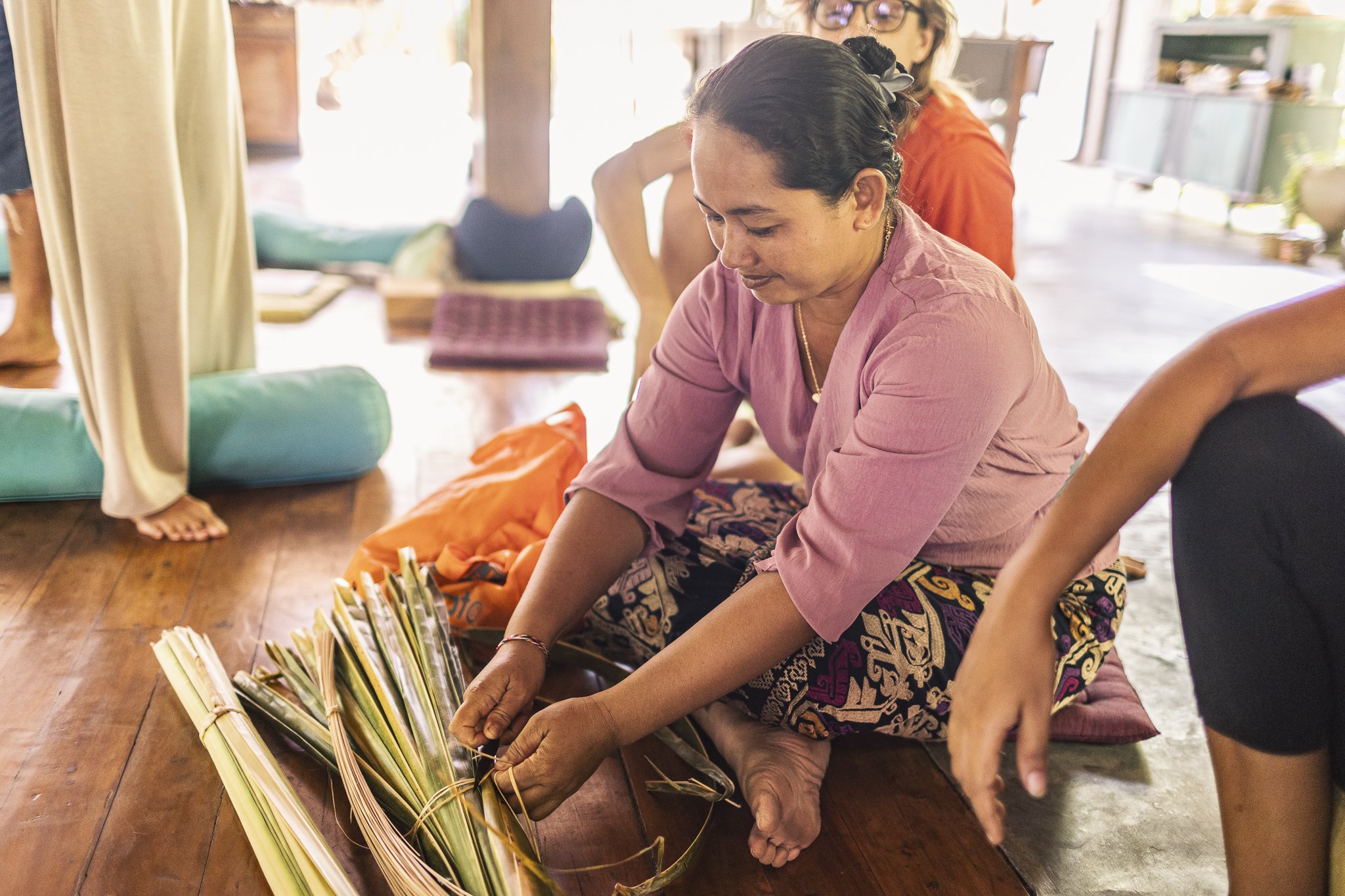
Reviews
Read authentic reviews from past tour participants.
One of the greatest experiences I have ever had. A completely unique journey to some wondrous ecovillage projects, full of inspirational humans. To share the tours with others with similar visions was enriching and a real privilige. I left feeling fulfilled and educated.
— Adam Bates
Best summer camp ever! A must see!! People, food and lodging were more than I could have hoped for in a travel experience like this!! Definitely will be back.
—Megan Zimmerman
It is an experience worth paying for. You get to know places and people who are on the real hands on effort for bringing change and make local ecosystems more resilient.
— Edward Bryce
Ecovillage Tours has put something really special together. The amount of research and care they have put into this trip is impressive in and of itself and have helped facilitate meaningful connections both within the tour group and with the communities hosting us. This eye opening experience has the potential to change your life by exploring more unique paradigms.
— Nathan Oxenfeld

Is this tour right for me?
On the fence? Discover if this tour is meant for you.
Choosing to embark on an ecovillage tour is an investment in your journey into intentional community living. Thanks to years of relationship building with community founders, we’re able to give you an experience that’s simply not available to the regular traveler.
Still unsure?
Explore if this tour is right for you…
This tour ideal for those who want to:
Join intentional communities: Engage directly in projects that focus on environmental and social regeneration, creating vibrant, sustainable spaces for communal living.
Explore sustainable living: Dive into the world of ecovillages as a lifestyle choice, integrating principles of ecological balance and community harmony into your daily life.
Network with regeneration leaders: Forge deep connections with key figures in the regenerative movement, gaining inspiration and momentum to advance your life's purpose.
Get a true eco-vacation: Embark on adventure travels that support ecovillages, choosing experiences that contribute positively to the planet and align with your values.
Learn from successful projects: Observe and study the approaches of others, applying their strategies and innovations to develop your own land or community initiative effectively.
Why choose this tour?
Knowledgeable guides: Led by experts in ecovillages and intentional communities, as well as experienced group facilitators.
Authentic experience: We partner with local communities for a genuine and unfiltered experience.
All-inclusive: From eco-friendly lodging to local cuisine, we've got you covered.
Small group size: We limit the number of participants to ensure a personalized and intimate experience.
Hassle free travel: We cover all the logistics, so you can get the most out of the experience.
What’s the alternative?
You could try visiting intentional communities on your own, except that…
Many communities are not open to the public and, if they are, the founders will not give you their undivided attention as a just normal passer-through.
Figuring out the logistics of getting yourself around is a headache and you’ll have no immediate support if something goes awry.
Traveling alone isn’t as nourishing or nearly as fun journeying with a small group in an intentionally held container for connection.
It’ll take years of relationship building and financial investment to even come close to the experience that Ecovillage Tours is able to offer… because we’ve done all that work for you already!
Still have questions?
We are happy to help!
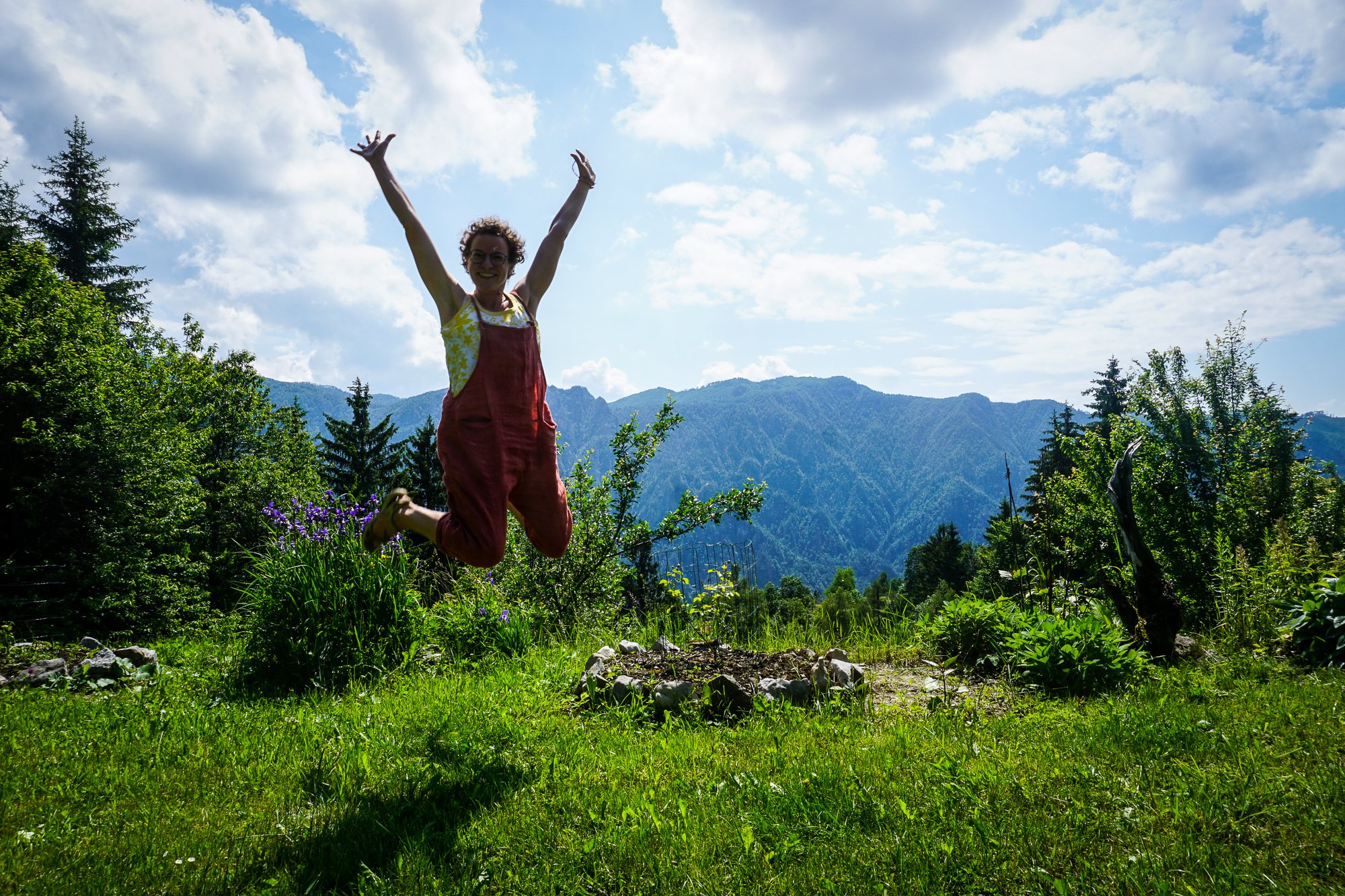
Ready to go?
The communities are excited to welcome you.
Let your adventure begin.



